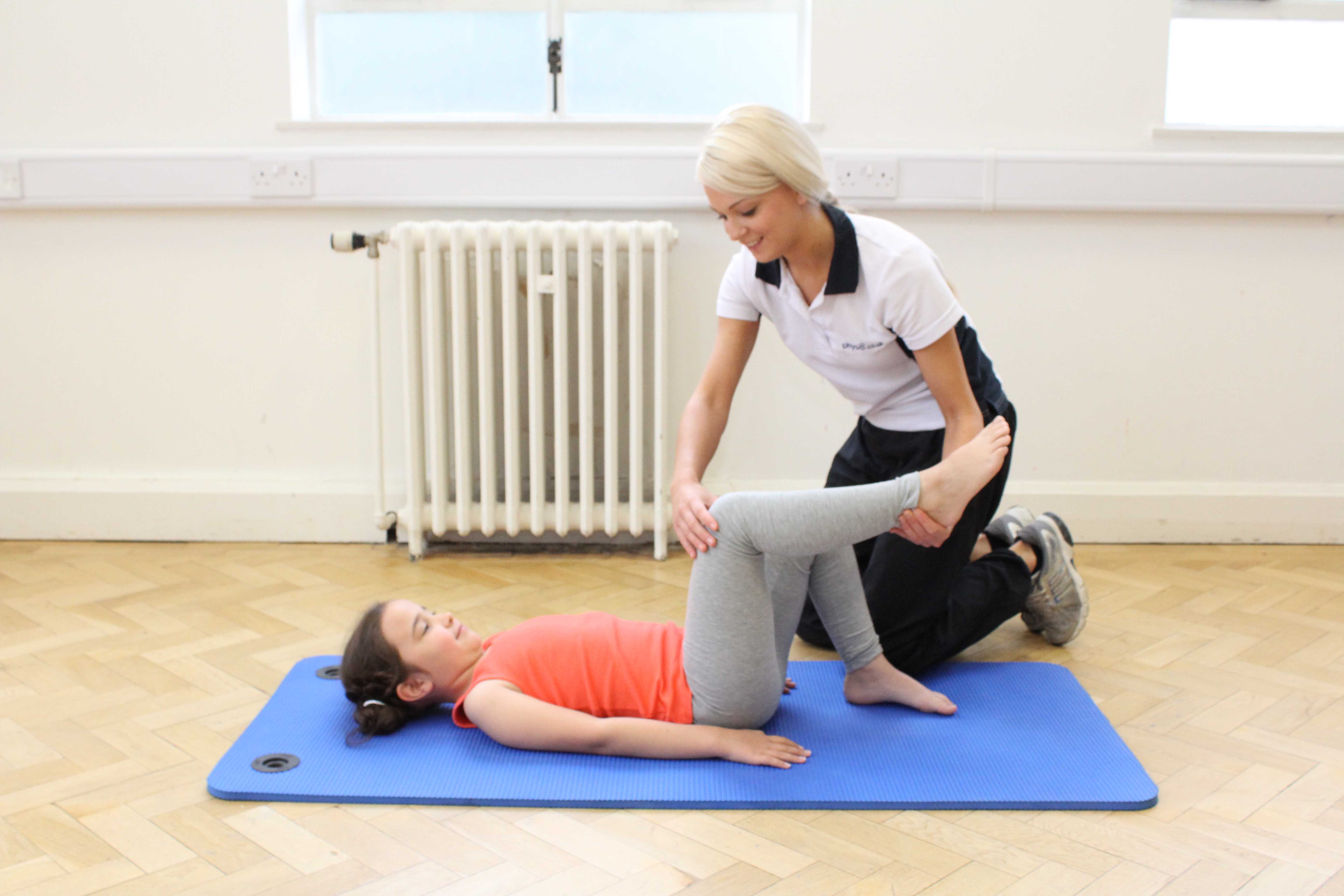What is meningitis
Meningitis is inflammation of the meninges. The meninges are the lining of the brain and spinal cord. Severe meningitis can cause a variety of long lasting physical symptoms that require specialist treatment and management by an experienced physiotherapist. Physiotherapy can help to build muscle strength, reduce joint stiffness and improve your baby’s rate of natural development.
Causes of meningitis
Meningitis is caused by bacteria or a virus.
Bacterial meningitis is the most serious form and can lead to long term brain damage and disability. Viral meningitis is the more common mild form of meningitis and the symptoms are like flu.
 Above: Passive hip, hamstring and calf stretches performed by an experienced paediatric physiotherapist
Above: Passive hip, hamstring and calf stretches performed by an experienced paediatric physiotherapistSymptoms of meningitis
It is important that the symptoms of meningitis are recognised early and that treatment commences as soon as possible. The symptoms your baby may experience include pale blotchy skin, a high temperature and shivering with cold hands and feet. You may notice a bulging at the soft spot on the top of your baby’s head or that they are breathing quickly. Each baby presents differently and whilst one baby may be floppy and drowsy, another will be very stiff and have quick jerky movements of the arms and legs. Additionally, vomiting or a lack of appetite may be symptomatic of meningitis. However, these symptoms do not confirm a definitive diagnosis; there are other causes of these symptoms. If you suspect your baby has meningitis it is a medical emergency and you should call 999 for an ambulance.
Diagnosis of meningitis
If meningitis is suspected your doctor will need to take a blood sample and perform a lumbar puncture to take a sample of fluid from your baby’s spinal cord.
Treatment for meningitis
The treatment for meningitis depends on whether it is caused by bacteria or a virus.
Bacterial meningitis is very serious and your baby will need to go to hospital for antibiotics and fluids through a drip.
Meningitis caused by a virus cannot be treated with antibiotics so your baby will need rest and care at home.
Physiotherapy for your baby with meningitis
Once medically stable, your baby will be discharged from hospital. Depending on the severity of the meningitis, your baby may have some residual symptoms that require physiotherapy treatment and management. A specialist physiotherapist from Physio.co.uk will complete a detailed holistic assessment of your baby’s needs in the clinic or home environment. The findings of the assessment will be discussed and your baby’s problems will be formulated into specific short and long term goals. A treatment plan for your baby after meningitis may include:
- Passive stretches and joint mobilisations
- Facilitation of active movement
- Activities in variety of postural sets – lying, rolling, sitting
- Monitoring of medical complications - seizures
- Monitoring of behavioural problems
- Strengthen and stretch all limb and trunk muscles
- Practice sitting up/crawling/rolling
- Maintain full range of movement in a variety of positions
- Improve alignment of the body duringplaytime and rest periods
- Develop strategies to overcome visual or hearing problems
- Minimise the risk of respiratory complications
Why Physio.co.uk for your baby after meningitis
At Physio.co.uk, we have an in-depth understanding of the symptoms and management of meningitis and how it affects babies. Your specialist physiotherapist will provide a thorough and detailed assessment of your baby’s condition. Research shows that physiotherapy significantly improves functional outcome for babies with meningitis. Treatment provided by Physio.co.uk will be evidence based and delivered to a high standard in the clinic or home environment.
- Treatment at home or in the clinic
- Dedicated, professional physiotherapists
- Be shown how to assist your baby’s recovery via careful handling and positioning
- Be taught specific exercises and stretches to complete in your own time with your baby
- Advice and provision of appropriate equipment
- Access to hydrotherapy
- Access to occupational therapy
- Access to speech and language therapy

 0330 088 7800
0330 088 7800


































